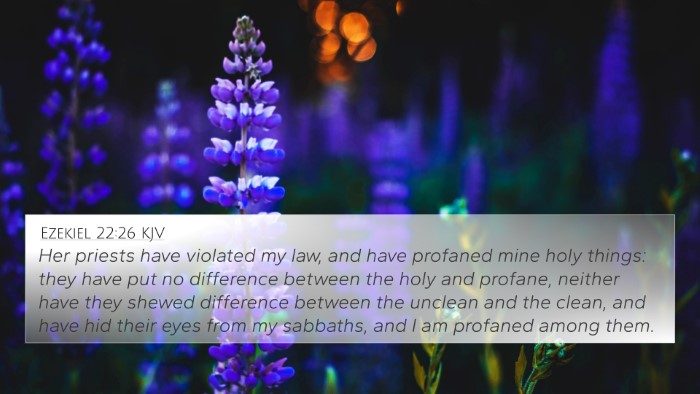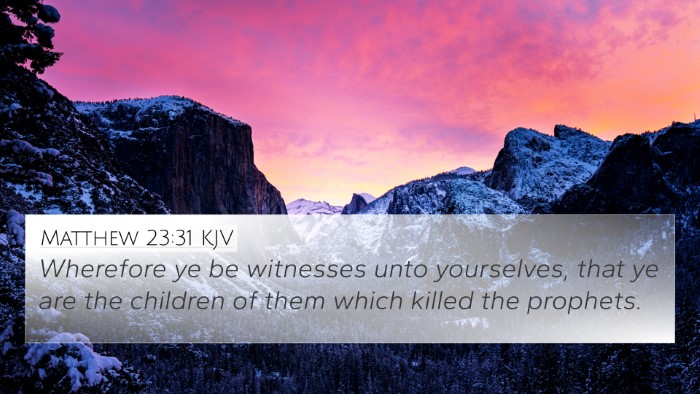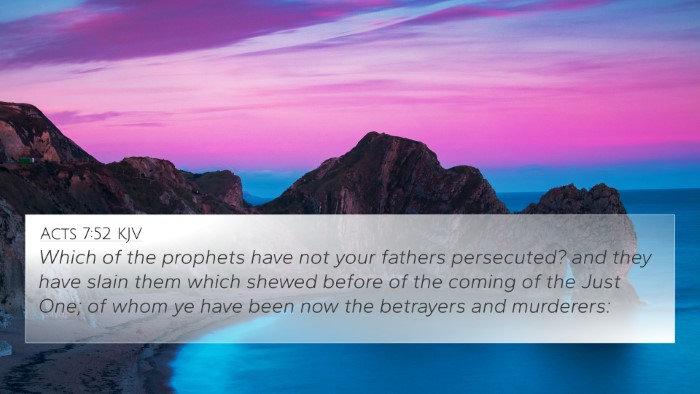Lamentations 4:13 - Summary and Insights
Lamentations 4:13 reads: "Because of the sins of her prophets and the iniquities of her priests, that have shed the blood of the just in the midst of her." This verse conveys profound truths about sin, accountability, and the consequences of spiritual leaders' actions. In this analysis, we will draw on insights from notable public domain commentaries, including those of Matthew Henry, Albert Barnes, and Adam Clarke, to unpack the meaning of this verse.
Contextual Overview
The Book of Lamentations, traditionally attributed to the Prophet Jeremiah, is a poignant expression of grief and lament over the destruction of Jerusalem. This specific verse addresses the culpability of spiritual leaders in the community. The verse highlights a grave reality: the sins of those in positions of authority lead to the suffering of the innocent.
Insights from Commentaries
Matthew Henry emphasizes that the verse illustrates the correlation between sin and suffering, particularly how leaders are held to a higher standard. Their failures have a ripple effect, impacting the entire community. He notes that the "prophets" and "priests" are essential to divine guidance, and their corruption leads to dire consequences, showcasing the moral obligations of leaders.
Albert Barnes expands on the idea of accountability, pointing out that the shedding of innocent blood signifies a breaking of divine laws. He suggests that these actions not only lead to physical suffering but also represent a deeper spiritual crisis within the people of God, reflecting a betrayal of their covenant with the Lord.
Adam Clarke interprets the mention of "the just" as a reference to the righteous individuals who suffer due to the wickedness of their leaders. Clarke elaborates on the historical context, stressing that the actions of the prophets and priests were not merely personal failings but a collective sin that brought about calamity for the nation as a whole.
Cross-References to Lamentations 4:13
To further explore the themes presented in Lamentations 4:13, we can cross-reference with several other Bible verses:
- Jeremiah 23:1-2 - Addresses the responsibility of shepherds (leaders) and the judgment that will come upon them for leading astray.
- Ezekiel 34:10 - Similar emphasis on the shepherds of Israel and their failure to care for the flock.
- Isaiah 56:10-11 - Critiques Israel's watchmen who are blind and ignorant, representing a prophetic warning.
- Micah 3:11 - Speaks to the corruption of prophets and priests seeking bribes, affecting their integrity and the people's fate.
- Matthew 23:34-36 - Highlights how Jesus condemns the leaders of His time, echoing the sentiments of Lamentations regarding the shedding of righteous blood.
- Hebrews 13:17 - Reinforces that leaders will give an account for their oversight, aligning with the accountability theme.
- James 3:1 - Notes that not many should become teachers, as they will face stricter judgment, underscoring the weight of responsibility that comes with spiritual leadership.
Thematic Connections
The broader themes of sin, accountability, and leadership resonate throughout the Scriptures. By examining these connections, we can appreciate the depth of Lamentations 4:13 in the context of the Bible as a cohesive narrative on moral integrity and divine justice:
- Sin and its Consequences: Across the Old Testament, the repercussions of sin highlight the justice of God, linking back to the lament over Jerusalem’s suffering.
- Leadership and Responsibility: The failures of leaders in various contexts (both Old and New Testament) show that their actions have lasting impacts on their communities.
- The Role of Prophecy: The prophetic voice in Scripture consistently warns against injustice and calls for repentance, reminiscent of Jeremiah’s messages.
- God’s Justice: The overarching theme that God ultimately holds both leaders and nations accountable is seen throughout the Bible, from the Prophets to the Apostolic writings.
Application of Insights
Understanding Lamentations 4:13 encourages believers today to consider the weight of their actions and the importance of integrity in leadership. It serves as a solemn reminder that both spiritual leaders and laity must strive for righteousness and accountability within their communities. Through careful study and cross-referencing Bible scriptures, readers can draw deeper insights and create meaningful connections across the Biblical text.
Tools for Further Study
For those seeking to delve deeper into cross-referencing Bible study, consider utilizing the following resources:
- Bible Concordance: A comprehensive tool for finding themes and connections across various verses.
- Bible Cross-Reference Guide: Helps identify related verses and parallel themes.
- Cross-Reference Bible Study: Various methods to study the Bible in a comparative context.
Conclusion
Lamentations 4:13 serves as a critical reminder of the responsibilities associated with spiritual leadership and the impact of sin on the broader community. A careful examination of this verse, enriched through comparative Bible verse analysis, offers valuable lessons that are applicable to both ancient and contemporary contexts.

















